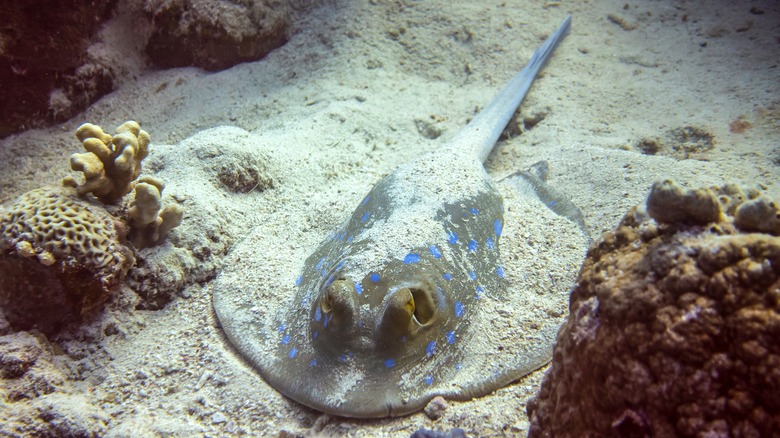Brie Schmidt
Why the stingray shuffle works

Though stingrays have a tail designed to be used as a weapon, they tend to be gentle creatures who try to avoid humans and other threats. The animal typically only stings out of self-defense, such as when it gets stepped on. Unfortunately for humans, stingrays are known to blend into the ocean floor, making them hard to spot with the naked eye, especially when the water is cloudy. That’s why popular swimming spots like California’s Huntington Beach have started recording stingray activity to warn visitors of the camouflaged fish.
Besides relying on warning systems, the stingray shuffle can help ensure you don’t accidentally stomp on a stingray and trigger an attack. Dragging your feet over the sand also sends vibrations through the ocean floor, which stingrays can sense. Once a stingray feels your movement and realizes a human is approaching, it will generally swim away, protecting both you and them from a scary confrontation.
What to do if you get stung by a stingray

The stingray shuffle is a simple and effective way to avoid getting stung by a stingray. However, if one of these creatures feels provoked, it may still attack. Stingray stings can be extremely painful and may cause a host of other symptoms, including bleeding, dizziness, headache, nausea, and swelling.
Despite the discomfort, getting stung by a stingray doesn’t have to ruin the relaxing beach vacation to an island off the coast of Florida you planned for months. The punctures, along with their venom, aren’t generally life-threatening, and you can begin treating the wound right after the sting occurs. If the injury is superficial, Healthline advises staying in the water and trying to clear out any barbs in the skin. Then, apply pressure to the site to slow the bleeding. Once you leave the water, wash the wound and soak the area in hot water to help draw out the venom and relieve the pain.
Note that a medical professional should always promptly treat severe stings. If the stingray punctured your throat, neck, stomach, or chest, or if the wound is deep, seek emergency care right away. Immediately see a doctor if you experience shortness of breath, fainting, irregular heartbeat, muscle paralysis, sweating, or seizures after getting stung.

